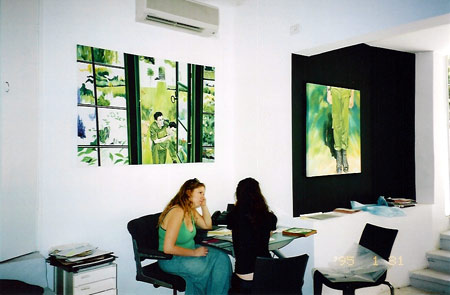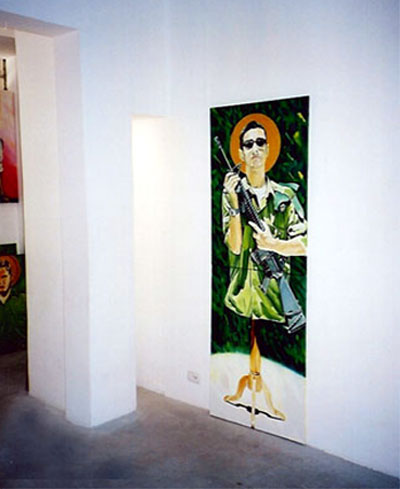.
.
.
.
.
.
.
.
.
.
Back
Next .
. . . . .
![]() . . . . . .
3.6.2003 >> 1.7.2003
. . . . . .
3.6.2003 >> 1.7.2003
"Soldiers"
.
.
.
.
.
.
.
.
To the Gallery - click here
Raffi Dayagi’s exhibition Soldiers is a cultural
work indicating an affinity between the artist’s personal fate and those
of his contemporaries; thus it might have influence and offer
encouragement. Dayagi’s identification with his male counterparts has
spawned the paintings of soldiers, who seem to have been born to be
Israeli cultural heroes. Are they martyrs by their very affiliation to
this nation? They are different, other, homosexual, uniform-wearers; “they
are marked,” to quote Dayagi, who was a soldier in the IDF when he
discovered his new sexual identity, which differs from that of the
majority of “straight” soldiers.
Dayagi created eighteen paintings depicting ten soldiers in oil on canvas.
He photographed the models with a color Polaroid camera, and subsequently
executed the paintings in his studio without their physical presence. He
selected them according to personal preference. All of them, like him, are
men who belong to a group closed by its sexual identity. They are young,
youthful, at army service age. Dayagi observes them and thinks of the
“hero who conquers his passions.”
Their names – Yossi, Uri, Yiftah, Ido – attest to their Israeliness. Yes –
they are narcissus-like – sweet smelling, beauty loving. The link between
stereotypes of sexuality and soldiers sounds ostensibly impossible, but
after three years of working on the subject Dayagi has managed to break
all the barriers and set new standards. He undermines the fixation whereby
homosexuals are presented in art works only in nude or in erotic postures
that leave no room for doubt as to the sexual identity of the male model…
Is this a historical document reflecting a new facet in Israeli society
that has for many years worshiped the figure of the macho in an IDF
uniform? Will the Zionist dream about a Jewish army be able to contain
Dayagi’s soft, caressing gaze on young, well-built, handsome soldiers from
the sea, air and ground forces, crowned with a garland of narcissus
flowers, delicately and graciously eating grapes? Will they remain Israeli
cultural heroes?
Raffi Dayagi
Born in Tel Aviv in 1950. Grew up in Kibbutz Ayelet Hashahar. Lives and
works in Tel Aviv. Self-taught. Guest lecturer at the WIZO Haifa College
of Art and Design for eight years. 1974-1998 Art Director in various
advertising firms. Since 1998 devotes himself exclusively to painting

